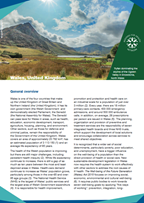World Health Organization (WHO)
WHO was founded in 1948 to work for the attainment of the highest
possible level of health by all peoples. WHO works with 194 Member
States, providing leadership on global health matters, shaping the
health research agenda, setting norms and standards, and articulating
evidence-based policy options. It also provides technical support to
Member States, monitors and assesses health trends, funds medical
research and provides emergency aid during disasters. Through its
programmes, WHO also works to improve nutrition, housing, sanitation and
working conditions around the world. It is headquartered in Geneva,
Switzerland and has six regional offices around the world.
The European Region (WHO/Europe)
WHO/Europe is one of WHO’s six regional offices around the world. It serves the WHO European Region, which comprises 53 countries, covering a vast geographical region from the Atlantic to the Pacific oceans. WHO/Europe staff are public health, scientific and technical experts, based in the main office in Copenhagen, Denmark, in 7 technical centres and in country offices in 30 Member States (plus one planned). In addition, WHO/Europe coordinates with the European Union and its agencies, and is host organization and partner of the European Observatory on Health Systems and Policies.
Regions for Health Network (RHN)
Since 1993, the WHO European Regions for Health Network (RHN) has helped regions to accelerate the delivery of improved population health. RHN is committed to the implementation of Agenda 2030 and the European Programme of Work (EPW), 2020 –2025.The Network is instrumental in efforts “to support local living environments that enable health and well-being”.




